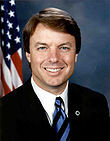1998 United States Senate election in North Carolina
| |||||||||||||||||
| |||||||||||||||||
 County results Edwards: 40–50% 50–60% 60–70% 70–80% Faircloth: 40–50% 50–60% 60–70% | |||||||||||||||||
| |||||||||||||||||
| Elections in North Carolina |
|---|
 |
The 1998 United States Senate election in North Carolina was held November 3, 1998. Incumbent Republican U.S. Senator Lauch Faircloth decided to seek re-election to a second term, but was unseated by Democrat John Edwards, a trial attorney.[1] As of 2022[update], this is the last time a Democrat won North Carolina's class 3 Senate seat. Edwards declined to run for reelection in 2004, choosing instead to run for President of the United States.
Republican primary
[edit]In the Republican primary, Faircloth easily defeated two minor candidates.[2]
Democratic primary
[edit]Candidates
[edit]- Bob Ayers Jr.
- James Carmack
- John Edwards, Raleigh attorney[3]
- Gene Gay
- D. G. Martin, former vice chancellor of the University of North Carolina at Chapel Hill and candidate for U.S. Representative in 1984 and 1986[3]
- Mike Robinson
- Ella Scarborough, former Charlotte City Council member[3]
Declined
[edit]- Mike Easley, North Carolina Attorney General since 1993[4]
- Harvey Gantt, former mayor of Charlotte and nominee for Senate in 1990 and 1996[4]
- Mike Robinson, Davidson County businessman
- Charlie Sanders, former CEO of Glaxo and candidate for Senate in 1996[4]
Going into the 1998 campaign, several prominent Democrats declined to run for Senate, including Attorney General Mike Easley, former Mayor of Charlotte Harvey Gantt, and former Glaxo CEO and 1996 Senate candidate Charlie Sanders.[4]
Results
[edit]In the Democratic primary, Edwards defeated his closest rival D.G. Martin, former vice chancellor of the University of North Carolina at Chapel Hill. The race also featured former Charlotte city councilwoman Ella Scarborough and several minor candidates.[3]
| Party | Candidate | Votes | % | |
|---|---|---|---|---|
| Democratic | John Edwards | 277,468 | 51.38% | |
| Democratic | D. G. Martin | 149,049 | 27.60% | |
| Democratic | Ella Scarborough | 55,486 | 10.28% | |
| Democratic | Bob Ayers Jr. | 22,477 | 4.16% | |
| Democratic | Mike Robinson | 20,178 | 3.74% | |
| Democratic | James Carmack | 8,200 | 1.52% | |
| Democratic | Gene Gay | 7,173 | 1.33% | |
| Total votes | 540,031 | 100.00% | ||
General election
[edit]Candidates
[edit]- John Edwards, Raleigh attorney (Democratic)
- Barbara Howe (Libertarian)
- Lauch Faircloth, incumbent U.S. Senator since 1993 (Republican)
Campaign
[edit]During the campaign, Edwards fashioned himself as a "people's advocate", while Faircloth accused Edwards of being too friendly towards labor unions.[5] Referring to Edwards as a "tobacco-taxing liberal", Faircloth's campaign ran ads alleging that Edwards' position on tobacco regulation would lead to job losses in the state.[6]
Edwards' campaign refused financial support from political action committees and ran ads criticizing Faircloth's record on Medicare and Social Security.[7] Edwards' victory was partially attributed by some observers to blowback against the Faircloth campaign's use of negative advertising.[8]
Results
[edit]| Party | Candidate | Votes | % | |
|---|---|---|---|---|
| Democratic | John Edwards | 1,029,237 | 51.15% | |
| Republican | Lauch Faircloth (incumbent) | 945,943 | 47.01% | |
| Libertarian | Barbara Howe | 36,963 | 1.84% | |
| Total votes | 2,012,143 | 100.00% | ||
| Democratic gain from Republican | ||||
See also
[edit]References
[edit]- ^ Clerk of the U.S. House of Representatives. "Statistics of the Congressional Election of November 3, 1998" (PDF). U.S. Government Printing Office. p. 33.
- ^ "State Board of Elections" (PDF). Archived from the original (PDF) on November 27, 2008. Retrieved June 28, 2010.
- ^ a b c d "Stuart Rothenberg: Money Makes A Difference -- Again - May 7, 1998". www.cnn.com. Retrieved February 13, 2022.
- ^ a b c d "EDWARDS SHOULD LEAD THE DEMOCRATIC TICKET\". Greensboro News and Record. May 1998. Retrieved February 13, 2022.
- ^ Dewar, Helen (July 11, 1998). "North Carolina's Stark Clash". Washington Post. Retrieved February 13, 2022.
- ^ Andron, Scott (October 26, 1998). "ATTACK ADS SIGNIFY CLOSE SENATE RACE\ SENATE CANDIDATES JOHN EDWARDS AND LAUCH FAIRCLOTH ACCUSE EACH OTHER OF LYING ABOUT EDWARDS' STANDS ON TOBACCO". Greensboro News and Record. Retrieved February 13, 2022.
- ^ "North Carolina Senate - November 3, 1998". CNN. Retrieved February 13, 2022.
- ^ Bragg, Rick (November 6, 1998). "THE 1998 ELECTION: THE DISCONTENTED; Rejecting Negative Advertising, and the Candidate". The New York Times. ISSN 0362-4331. Retrieved February 13, 2022.



